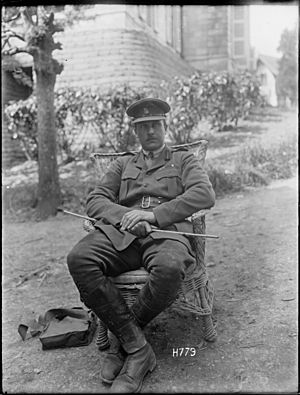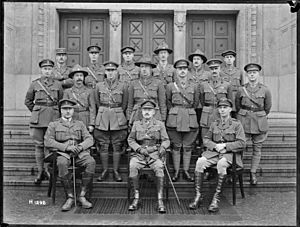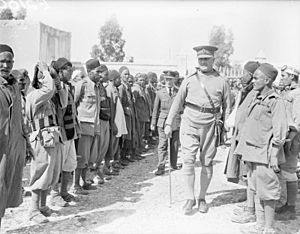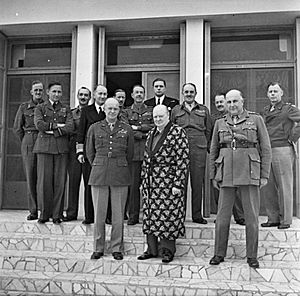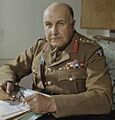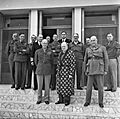Henry Maitland Wilson facts for kids
Quick facts for kids
The Lord Wilson
|
|
|---|---|
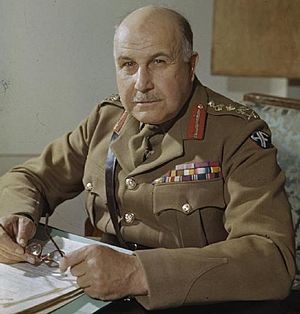
Henry Maitland Wilson
|
|
| Nickname(s) | "Jumbo" |
| Born | 5 September 1881 London, England |
| Died | 31 December 1964 (aged 83) Chilton, Buckinghamshire, England |
| Allegiance | United Kingdom |
| Service/ |
British Army |
| Years of service | 1900–1947 |
| Rank | Field Marshal |
| Service number | 17547 |
| Unit | Rifle Brigade (The Prince Consort's Own) |
| Commands held | 1st Battalion, Rifle Brigade (The Prince Consort's Own) 6th Infantry Brigade 2nd Infantry Division British Troops in Egypt British Forces in Palestine and Trans-Jordan Ninth Army Persia and Iraq Command Middle East Command |
| Battles/wars | Second Boer War First World War |
| Awards | Knight Grand Cross of the Order of the Bath Knight Grand Cross of the Order of the British Empire Distinguished Service Order Mentioned in dispatches (5) War Cross (Greece) Virtuti Militari (Poland) Army Distinguished Service Medal (United States) Legion of Merit (United States) |
| Other work | Constable of the Tower of London |
Field Marshal Henry Maitland Wilson, 1st Baron Wilson (5 September 1881 – 31 December 1964) was a very important British Army officer. People often called him Jumbo Wilson. He fought in the Second Boer War and then in the First World War. During the Second World War, he led British troops in Egypt. There, he launched a successful attack called Operation Compass against Italian forces in December 1940.
Wilson also became the Military Governor of Cyrenaica in 1941. He led a group of soldiers from different Commonwealth countries to help Greece in April 1941. Later, he commanded British forces in Palestine and Trans-Jordan. He then became the Supreme Allied Commander in the Mediterranean area from 1944. After that, he was the Chief of the British military team in Washington D.C. until 1947.
Contents
Henry Maitland Wilson: A Military Leader
Henry Maitland Wilson was born in London, England, on September 5, 1881. His father was Captain Arthur Maitland Wilson. Henry went to famous schools like Eton College and Sandhurst. He joined the Rifle Brigade as a young officer in 1900.
Early Life and First World War
Wilson started his military career serving in the Second Boer War in South Africa. He was promoted to lieutenant in 1901. After the war, he served with his battalion in Egypt and then in India. He became a captain in 1908.
When the First World War began, Wilson was appointed as a brigade major in 1914. He was sent to the Western Front in France in December 1915. He was known for being a very good staff officer, helping to plan military operations. He worked on major battles like the Battle of the Somme and Battle of Passchendaele. For his bravery and service, he received the Distinguished Service Order in 1917.
After the war, Wilson continued his military training. He commanded a company of cadets at Sandhurst. Later, he led the 1st Battalion of his regiment on the North-West Frontier. He was promoted to lieutenant colonel in 1927. In 1934, he became a temporary brigadier and led the 6th Infantry Brigade. By 1935, he was a major-general and commanded the 2nd Division.
World War II: Key Commands
In June 1939, just before World War II, Wilson became the General Officer Commanding (GOC) of the British Troops in Egypt. He was a lieutenant-general and also advised on military matters for many countries in the region. He set up his headquarters in Cairo.
Fighting in Egypt
When Italy declared war in June 1940, Wilson's forces immediately moved into Libya. However, the French surrendered, which allowed Italy to send more troops to fight Wilson. The Italian forces then invaded Egypt in September 1940. Wilson was outnumbered, with 31,000 troops against Italy's 80,000.
Wilson knew he had to think differently. He planned to attack the Italian forces at their weak points. On December 7, 1940, he launched Operation Compass. This plan was very successful. It quickly split the Italian forces in half. British Prime Minister Winston Churchill praised Wilson, saying he was "one of our finest tacticians." In February 1941, Wilson became the Military Governor of Cyrenaica.
Helping Greece
In April 1941, Wilson was chosen to lead a group of Commonwealth soldiers to help Greece. Greece was fighting against Italy and then Germany. Even though the Allied forces were not strong enough, Churchill's government felt it was important to support Greece. Wilson successfully helped evacuate British troops from Greece by April 29, 1941. He was promoted to full general in May 1941.
Leading in the Middle East
After returning from Greece, Wilson became the GOC of British Forces in Palestine and Trans-Jordan in May 1941. He led the successful Syria-Lebanon campaign, where Allied forces fought against French forces who were working with Germany. In October 1941, Wilson took command of the Ninth Army in Syria and Palestine.
Wilson was a favorite of Prime Minister Winston Churchill. In August 1942, Wilson was appointed to lead the new Persia and Iraq Command. This command was created because Germany was having successes in Russia and might invade Persia (Iran).
Top Commander in the Mediterranean
In February 1943, after Axis forces were pushed out of North Africa, Wilson became the Commander-in-Chief of the Middle East. In September 1943, he organized an unsuccessful attempt to take some small Greek islands. British forces suffered heavy losses from German air attacks.
On January 8, 1944, Wilson took over from Dwight D. "Ike" Eisenhower as the Supreme Allied Commander in the Mediterranean. This meant he was in charge of the overall strategy for the war in Italy and the surrounding areas.
A Mission in Washington
In December 1944, Wilson was promoted to field marshal, the highest rank in the British Army. He was sent to Washington D.C. in January 1945. There, he became the Chief of the British military team. One of his most secret jobs was to be the British military representative on a committee that dealt with the development of the atom bomb. Wilson stayed in this important role until 1947. President Truman of the United States gave him the Distinguished Service Medal in November 1945.
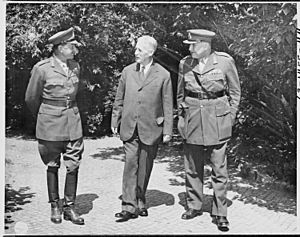
After the Wars
In January 1946, Henry Maitland Wilson was given the title Baron Wilson, of Libya and of Stowlangtoft in Suffolk. From 1955 to 1960, he served as the Constable of the Tower of London, an important ceremonial role.
Wilson married Hester Wykeham in 1914. They had one son and one daughter. His son, Patrick Maitland Wilson, also served in the Middle East during World War II as an intelligence officer. Field Marshal Lord Wilson passed away on December 31, 1964.
See also
 In Spanish: Henry Maitland Wilson para niños
In Spanish: Henry Maitland Wilson para niños
Images for kids
-
Secretary of War, Henry L. Stimson (center) with Field Marshals Sir Harold Alexander (left) and Sir Henry Maitland Wilson (right).
 | Laphonza Butler |
 | Daisy Bates |
 | Elizabeth Piper Ensley |


